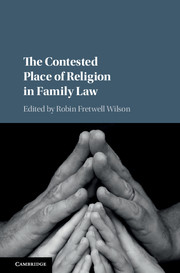Book contents
- The Contested Place of Religion in Family Law
- The Contested Place of Religion in Family Law
- Copyright page
- Dedication
- Contents
- Notes on Contributors
- Foreword
- Acknowledgements
- Introduction
- Part I The Foundations and Boundaries of Religious Liberty
- Part II Religious Claims at Birth
- 3 Religious Exceptionalism and Religiously Motivated Harm
- 4 Contraceptive Access and Religious Liberty
- 5 The Contraceptive Coverage Cases and the Problem of Politicized Free Exercise Lawsuits
- 6 The Substantial Burden Question: Secular Tools for Secular Courts
- 7 Coming Soon to a Court Near You
- Part III Religious Claims in Childrearing
- Part IV Rethinking Marriage After Obergefell
- Part V Religious Claims at the End of Life
- Part VI Shaping the Legal Culture of the Family
- Part VII International Perspectives
- Book part
- Statute Index
- Case Index
- Subject Index
6 - The Substantial Burden Question: Secular Tools for Secular Courts
from Part II - Religious Claims at Birth
Published online by Cambridge University Press: 11 May 2018
- The Contested Place of Religion in Family Law
- The Contested Place of Religion in Family Law
- Copyright page
- Dedication
- Contents
- Notes on Contributors
- Foreword
- Acknowledgements
- Introduction
- Part I The Foundations and Boundaries of Religious Liberty
- Part II Religious Claims at Birth
- 3 Religious Exceptionalism and Religiously Motivated Harm
- 4 Contraceptive Access and Religious Liberty
- 5 The Contraceptive Coverage Cases and the Problem of Politicized Free Exercise Lawsuits
- 6 The Substantial Burden Question: Secular Tools for Secular Courts
- 7 Coming Soon to a Court Near You
- Part III Religious Claims in Childrearing
- Part IV Rethinking Marriage After Obergefell
- Part V Religious Claims at the End of Life
- Part VI Shaping the Legal Culture of the Family
- Part VII International Perspectives
- Book part
- Statute Index
- Case Index
- Subject Index
Summary
- Type
- Chapter
- Information
- The Contested Place of Religion in Family Law , pp. 138 - 170Publisher: Cambridge University PressPrint publication year: 2018



